Psychology Addict # 55 | The Role Biology Plays in Defining Who We Are - A Critical Discussion.
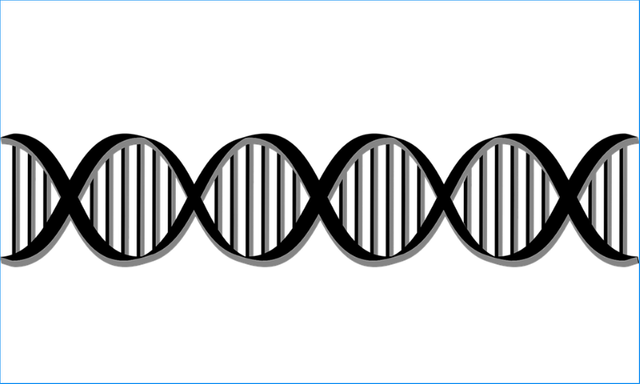
Schopenhauer was a German philosopher who came up with the concept of the Will-to-Life, which according to him is an internal force that pushes us forward and channels our life focus mostly towards sex, and all for the sake of reproduction. For Schopenhauer the only difference between us and animals is the capacity of self-awareness, which through the pessimistic lens with which he saw life it only served to make us unhappy. Love and romanticism, he claimed, took place in human being’s lives as a result of a loss of intellect, something, of course, caused by the Will-to-Life’s own agenda 1.
That was around one generation before Darwin. But nowadays we’re all acquainted with Darwinism, and it’s, therefore, easier to have a better grasp of the underling argument within Schopenhauer’s views. One of them being the role our biology has in influencing our behaviour, the way we interact with others as well as aspects of who we are/become.
In my own field this can be a bit of a touchy topic, particularly among those who lean more towards the social sphere. And then, there is the psychiatry world which more often than not limit their perspective to the biological aspects of the human condition, and c’est fini.
It can be a tug-of-war sometimes!
In Determining Our Mood & Their Corresponding Behaviour.
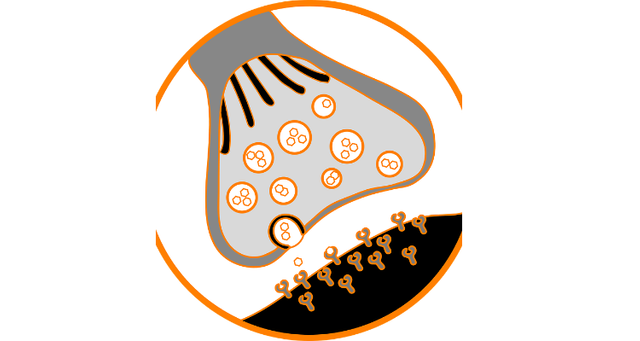
But when it comes to our mood, for example. One of the ways our biology plays a part in it is by means of neurotransmitter activities. Just in case you need a quick recap: neurotransmitters are chemicals stored at the end of neuron terminals, which following an action potential (a minute spike of electrical charge) it’s released and may occupy the receptors of a neighbouring cell. And guess what? This biological mechanism is very important in the regulation of mood. So much so, that one of the causes of depression is the abnormal activity of one, or indeed, more such neurochemicals [2]
Serotonin, for instance, is a neurotransmitter in charge of mood regulation, and is one which is commonly targeted in therapeutic treatments. In their study, Paul and Skolnick remark that around 65 per cent of patients treated with selective serotonin reuptake inhibitors (e.g. Prozac), reported improvement in symptoms of depression 3. Providing, possibly, some support for the claim that depression can stem from neurobiological mechanisms.
You might turn your nose up at research on antidepressants; for, they indeed aren’t always successful in treating depression. There have been studies suggesting, for instance, that anti-depressants are no better than a placebo. Nevertheless, I follow the believe that findings like this are partly owed to how antidepressant trials are performed 4 as well as to how the diagnosis of depression has been formulated.
Still, while neurotransmitter activities may offer an explanation for the biological basis of depressed mood, it is important to highlight that, as proposed by the biopsychosocial model, mental states and their corresponding behaviours generally result from the interplay that occurs between biological, psychological and social elements. All of which influence and modify one another.
The Role It Has in Moderating Attachment.
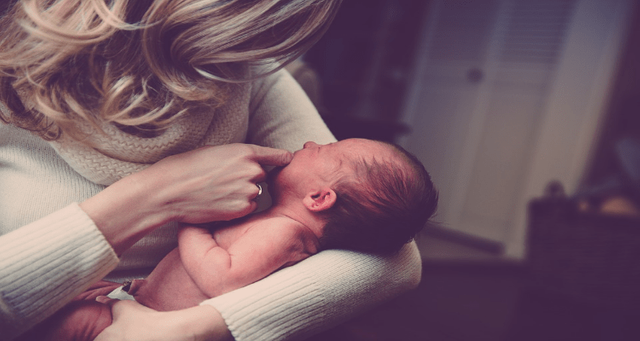
There are research findings indicating that our biology also seems to play a part in moderating attachment. Attachment is the mutual bond that unfolds between infants and their primary caregivers, who oftentimes is their mums. John Bowlby’s theory of attachment explains that such bond unfolds due to both: the tendency adults have to attend to infants’ needs, and babies’ predisposition to respond to care (e.g. smiling) [5].
This is, however, an interaction that may prompt different types of classifications: securely-attached, insecure-resistant and avoidant. According to the ‘Strange Situation Procedure’, an experimental study carried out by Ainsworth and her colleagues, these different attachment classifications are influenced by the quality of care mums provide their infants with. In other words, the more responsive and sensitive the mum is, the more securely attached the baby becomes [6]. Or, simply put: confident towards the mum’s care.
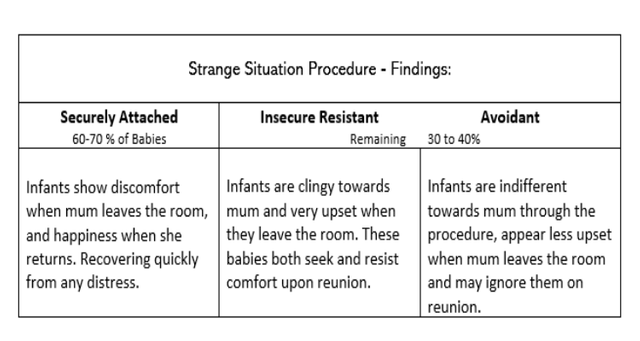
But then, something interesting came up quite recently: Genetic research revealed that babies carrying the minor mineralocorticoid receptor allele (which is involved in the regulation of stress) are more efficient (faster and better) at processing caregivers’ responses, and therefore, react to it accordingly. Like this, becoming, for instance, significantly more attached if their mums show parental sensitivity, and significantly less attached if their mums show extreme “insensitive” care 7. Suggesting that attachment may as well be moderated by genes. Who would’ve thought? 😊
If this is indeed the case, it further demonstrates how far the transaction that occurs between the individual’s biology, environment and psychology goes in influencing their characteristics and their social interactions. Because, it should not go unmentioned here that it has been found that secure attachment during childhood years have been linked to harmonious, solid and closer relationship with peers 8 as well as with romantic partners 9.
And the story continues …
In Influencing Gender Identity.

Gender identity seems to have become a bit of a thorny subject. With our past history being one of the many reasons for this 10. Still, if seen with maturity and the understanding that differences of this nature do not paint a picture of superiority vs. inferiority. Then, discussing the role biology plays in influencing gender identity becomes a very interesting one.
You see, it has been suggested that gender identity characteristics may result from in-utero biological processes which organise the brain in gendered ways. The Brain Organisation Theory of Gender supports such claims through explaining that exposure to sex hormones in pre-natal and perinatal stages produce sex patterns in both brain structures and functions 11. Some examples of this are the larger structures in male brains and greater hemisphere interconnection in female brains 12.
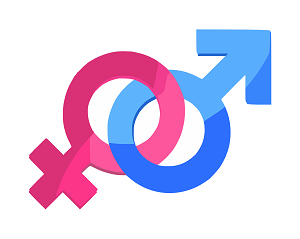
And here is when those more socially inclined peers of mine loudly and passionately step in! They eloquently argue that socio cognitive approaches to gender identity, explain that rather than formed through biology, gender identity is instead a result from the learning of, and adoption to social norms.13.
The argument goes as something along these lines: “male and female children are socialized into masculine and feminine adults through psychological and social determinants”. But I have a small problem with this perspective. And that is that it implies children just go on and take on board gender roles and acquire gender identities through repetition and passive observation. This is simply not what I see when I look back into our past, or in the present world around me!
To add further complexity to this matter, there are studies out there which demonstrated that pre-natal exposure to sex hormones continue to influence brain development in ways that generate ‘typical’ gender differences between boys and girls throughout adolescence. Namely, disparity in visuospatial and language skills 14 as well as types of psychological difficulties; with girls being at a greater risk of developing mood related conditions such as depression, anxiety and also eating disorders 15, 16 while boys are more susceptible to develop conduct disorders and ADHD 17.
Yet, if you dig into conduct behaviour problems and examine both boys and girls displaying this sort of issue the predictors don’t point to “maleness” of “femaleness”. It points to socio-economic environment and quality of parenting 18. One could just go on and on, really! Furthermore, note that while there is evidence demonstrating that gender may be a preprogramed feature in humans, there still lacks explanation for the wide diversity of gender differences and gender performances present in our current society.
I agree with Schopenhauer’s observations on the influence our biology has in pushing us into certain circumstances in life. An influence which is not a determining one, though. For, we humans have been equipped with the agency to be proactive about how to react upon our own mood and emotions, in the manner with which we interact with others, and through the choices we make when constructing our identities.
Reference List:
1 Metaphysics of Love..
2 Toates, F. (2001) Biological Psychology, Harlow, Pearson Education.
3 Glutamate and depression: clinical and preclinical studies.
4 Antidepressants versus placebo in major depression: an overview.
5 Bowlby, J. (1969) Attachment and Loss: Vol.1. Attachment, New York, Basic Books.
6 Aisworth, M.D.S., Blehar, M., Waters, E. and Wall, S. (1978) Patterns of Attachment: A psychological Study of the Strange Situation, Hillsdale, NJ, Erlbaum.
7 The association between parenting and attachment security is moderated by a polymorphism in the mineralocorticoid receptor gene: evidence for differential susceptibility.
8 Infant-mother attachment and children's friendship quality: maternal mental-state talk as an intervening mechanism.
9 Early Roots of Adult Competence: The Significance of Close Relationships from Infancy to Early Adulthood.
10 Rousseau's Take on Women and Education.
11 Hormones, context, and "brain gender": a review of evidence from congenital adrenal hyperplasia. 12 Sex differences in the brain: implications for explaining autism. 13 Social Cognitive Theory of Gender Development and Functioning. 14 Sex differences in neural processing of language among children. 15 Gender Differences in Depression. 16 Psychopathological Development Across Adolescence 17 Disorders of Childhood and Adolescence: Gender and Psychopathology 18 Mean girls and bad boys: Recent research on gender differences in conduct disorder.


My Dear Reader,
Thank you for reading my work here on the platform once more. You do know it means the world to me 😊
Ps: I understand next week is HF21 week, so based on my past experiences I am not going to be posting then. As the platform tends to go through a short “non-user-friendly” period following hardforks! But, I’m still going to be around to see what you guys will be up to! <3
Calling @alexander.alexis!!
What a post. 🌟 I am once again hungry for more, as is true whenever you write. Of course, this discussion has no end. You are clear about that. In so many aspects of this subject one has to take some position, but always with qualifiers. It's bigger than nature nurture. And we have so much to learn.
While I was reading I thought about my own children as infants and the quality of my parenting. And then I think...that ship has sailed. I did my best :))
I found this fascinating:
You mention the way prenatal hormones may influence gender preference. I'm wondering about how epigenetic factors my influence expression of this stress regulator gene, so that, the stress of the parent may become a kind of generational legacy, even before a child is born.
Such a complicated subject. And you handle it in such a balanced way--enlightening us without lecturing.
Hardfork 21. Feels like a blockchain apocalypse. I've no understanding of this at all. Keeping my fingers crossed and hoping for the best.
I'll see you in a couple of weeks, no doubt with another rich post.
With great affection and respect,🌞
Your New York friend,
AG
Hello agmoore2 😍
There are so many layers to the human condition right? All interdependent influencing one another and so forth, and so forth ... my goodness :)
I am so very glad you found this post interesting. Like you, I am also fascinated by how attachment might be moderated by genes.
And ... that is definitely the spirit, what might have been done or not done in bygone days is done and dusted. The sensible thing to do is to live the present moment wisely. Lamenting the past is not included in that! :)
HF21 week here we come! Fingers crossed :P
It's a hot day today over here my friend. But it's nice!
Lots of love to you always, all the way from across the ocean :*
Your friend,
Abigail
Learn from the past. Look to the future. Only way to survive :)
I'll see you on the other side of Hardfork. Whatever that is like, I'll still be here.
Have a wonderful, peaceful day.
Love,
Your New York friend,
AG
there are a lot of interesting gendered behaviors. for example boys tend to prefer playing with car toys and girls with doll toys. they also have different playmate preferences and boys tend to play more "rough" with each other. if i recall there are differences in what they tend to draw too. and all those behaviors correlate with testosterone levels in utero. toy preference has also been seen non human primates, further suggesting raw biological rather than social origin.
i wrote about many of these differences before: https://staging.busy.org/@tychoxi/sexual-development-of-the-brain
So did I ;)
Only today I left this comment to @alchemage:
We've been exchanging comments on a post he wrote entitled:
The Social Birds & the Bees: The socialization of gender, a toy store ethnography.
It's, perhaps, something you would be interested in. But, beware it does focus a lot on the social aspect of gender identity formation.
Thank you for stopping by @tychoxi, I will definitely read your article. This topic sparks great interest in me and I have just learnt from your comment about the biological basis for boy's and girl's different drawings. Although, it makes sense though. If one thinks about it :)
Best,
Abigail.
I think problem with most people esp when we are in realm of behaviour is what Sapolsky might call categorical thinking. We tend to try and explain this as completely dependent on nurture or genes, or neurotransmitter, or hormones or evolutionary history. But a simple behavioural act, say something as simple as a smile to a certain stimulus is all of it at once.
Are there social cues that train us that we should smile at a certain context A but not at context B? Yes
Are there neurons which fire and release neurotransmitters to make us smile for context A and inhibit it for context B? Yes.
There would also be hormones that we're secreted when something made us happy and something did not. There would be hormones that would predict our responsiveness to happiness.
Are there genes which if present can make us more sensitive to judging when to smile and when to not? I mean these could be genes involved in development of brain regions involved in judging social cues. There will be genes involved in learning social cues and responding to them. And that one simple simple in right context would be cumulative effective of all these genes?
But is having and missing certain genes tells the whole story? Well, genes have be expressed. The quantity of expression of various genes are under influence epigenetic control. A certain exposure to stress during prenatal and neonatal life may influence, say how corticosteroid receptor genes will be expressed. This may predict how one may repo and to stress for all their life. Whether they will be resilient, alert or anxious? This will eventually effect how they will respond to social cues. How shy they feel in smiling how how confidently they smile. This may also program to to smile in wrong context.
Is there an evolutionary reason why we smiled in certain context and why not in other? Perhaps judging social cues right might have improved fitness. Smiling right meant more friends or more mates, who knows.
I don't know why would gender identity, attachment, depression are debatable for biological origin. If it is happening in a biological system, there has to be associated biology.
It's like asking if an AI code written in a computer that made computer better at finding a certain pattern in data a function of computer hardware or it's programming post manufacture. Well, of course programming played a role. But remember not all hardware configurations would be equally efficient or capable for similar program. At the end of the day it's hardware that executed the program. For biology the hardware is even a bit tunable. Moreover, there would be some explanation for why a hardware compatible to efficiently execute the program came into being.
Hey @scienceblocks :)
Great discussion about categorical thinking with concern to human behaviour.
There are so many layers to it. And as I use to think: one can just go on and on :)
Whenever I find myself in the midst of such debates I always emphasize that we are first and foremost biological entities. But, you would be surprised to find out about how the biological basis especially of gender identity and depression are rejected among sociologists and counselors (at least the ones I happen to know and come across). In this day and age!
I wish you a wonderful day :D
I attend talks on diversity (as a member of national selection committees in France) and there are definitely weird studies going into that direction. Take a given geometry test where a complex picture of intricate geometrical shapes has to be reproduced. Give the exercise it to high school boys and girls as a geometry test. Boys do generally better than girls. Take the same test but give it as a drawing test. Girls do generally better than boys. And there are many more examples (but this one is the one that marked me most).
All of this to emphasise that there are differences between boys and girls, or male and female. I hope I won’t be burned for having said that (note that I only said what I wrote and did not understand anything).
PS: Next week is HF21… we should just continue to do what we usually do :)
There are various studies out there pointing to this very reality @lemouth. And it's just too bad it has become such a contentious subject matter. I believe that societies as a whole would gain much more in understanding and respecting these differences, than rejecting them. Alas!
Thank you for stopping by and contributing to this discussion with such an interesting personal observation :)
I wish you, lamouthe & the boys a great, relaxing weekend!
My main concerns with those studies is that many people just ignore them. There are people who want to push the male-female equality to the end. I cannot understand that.
I hope you are enjoying your week-end. I am leaving tomorrow for Germany for a week, the family waiting for me in France (work has restarted, so have travels... ;) )
Have a safe trip :)
Thank you!
Oh, you are here?
Yes, I am in Mainz for 2 weeks (with an interruption over the week-end). It is slightly far from Hamburg ;)
Bummer! I really would like to meat you, one day. :)
Have a nice stay in Mainz. Never been there myself, so you must tell me, how you liked it.
Greetings to you!
This is a really nice city (especially the altstadt part) with a lot of nice restaurants where it is pleasant to say. Still a few days here before going back ^^
I do not know when I will be back in Germany next, and where, but I will keep you updated.
enjoy!
I have some other topic I'd like to have some support. You may know me by now, I am quite fascinated by the systemic approaches within the sciences but also in social environments. I proposed an experiment yesterday on my blog. Would it bother you, to take part in it? One could see it as a little scientific experiment even though I don't say that in particular. The post is unusually short for what I otherwise publish ;-)
Maybe one day we will finally make it to meet in Hamburg.
A great read - as always. And a ground for discussion. ;-)
I think what you miss is that EVERYTHING, also social and psychological phenomena, result from biochemical reactions. Our brain, our nerves works through biochemical reactions.
Biochemistry is not only affecting our moods through hormones and neurotransmitters, but also the manifestations of moods are biochemical, even if for us, they "feel" social or psychological.
The only problem is that most molecular-biologic systems involved are much too complex and tiny to be understood (and I doubt science will ever do). Thus, we have to move several steps away and look at the big picture, we have to abstract those processes to the point that we don't even think about them in order to understand anything. This is called Psychology. It is the extension of biology with different methods to explain human behavior.
Of consequence, all phenomena have two sorts of causes:
a) biological causes that we can already explain, e.g. the X/Y chromosome
b) biological causes that we (yet) cannot explain at the biological level, but only by abstraction (i.e. psychology), e.g. adoption of social norms.
Hey @sco :D , how nice to see you here ! It pleases me very much that this post has provided you with an enjoyable read.
I have been mulling your comment over for a little while now. I was particularly drawn to how you described psychology here:
What an interesting perspective. Thank you for presenting it to me.
And then, of course, you also pointed out the following (which struck me a bit to begin with, as I first interpreted as a “one-way-road” perspective of addressing the human condition):
You see, psychologists tend to adopt a more back and forth approach. You know, brain/mind, mind/brain – psychological phenomenon/society – society/psychological phenomenon. You get it. One of the reasons for this being the way with which, for instance, it has been seen that not only our neurobiological mechanisms yield certain moods and their corresponding behaviours, but also how behaviour also changes neural networks, consequently changing how we feel and so forth.ref.,ref.. A two way-way road, if you will.
Had you made the above remark about non-human animals I wouldn’t have blinked. But, I assumed you’re talking about us, humans (or, at least about also us! 😊). Then, I thought of higher-order cognitive processes, and even metacognition. Still, what are these processes if not the manifestation of a synaptic self? As LeDoux puts it. And it is because of such functions that for us, humans, these “feel” psychological and social, as you suggest. Rhum …
Yet, I believe we aren’t prepared to abandon this categorical breakdown: biological, psychological, social. For the very reason you pointed out here: “molecular-biologic systems involved are much too complex and tiny to be understood (and I doubt science will ever do).”
Then, the way I see this is, while all that encompasses the human condition might depart from one single point : biochemical reactions. It does so intertwining all the multi-dimensions that give rise to who we are, those that can be explained, and those that can not. To and fro, to and fro.
Thank you for taking the time to write this comment here @sco. You definitely intrigued me, and got me thinking today.
With Respect,
Abigail
PS: Thank you for the re-esteem! :)
You got me thinking first! ;-)
Exactly what I meant. In the end, the question is almost philosophical, right? Does it even matter that everything departs from biochemistry if we cannot solve the biochemical puzzles and thus never fully understand the multi-dimensional connections and interactions that define us?
Philosophical indeed. It's beautiful 💗 :)
greatly put.
It does not matter very much, if you ask me :) It's almost always enough to be aware that we do not fully understand. And knowing that everyone can choose to be sensible within interactions with others.
Great post!
I personally believe that every human behavior is influenced both by the individuals biology as well as social factors. That includes their identity and who they become in life. Basically it comes down to how the individuals genes interact with their environment. Its funny how people in different fields often tend to believe that these things are attributed to either the individuals biology or their social environment though - as you pointed out with your colleagues. Some people believe that it is an either or scenario. But I dont think that we can say that these are either or scenarios personally. They will always be both. Genes definitly play a huge role in a individuals behavior and interestingly, different environments can activate and influence different genes.
I find the topic of attachement pretty interesting, especially since research suggests that an individual's attachement style carries with them into adulthood but also that a secure attachment style can be learned and developed overtime even in adulthood. I wasnt aware that genes play a role in that as well. That was really interesting.
The part that you discuss regarding sex hormones in utero influencing gender is quite interesting as well. I only have a limited understanding of that but find it quite facinating. It seems that even birth order may have an effect on that as well as sex hormones can change and be influenced by previous pregnancies. Kind of like a countering effect. Again, my understanding of that is limited though. And as you pointed out, socioeconomic factors also often play a role in an individuals behavioral development (if im understanding correctly).
I personally think that the moral of the story (so to speak) is that in the end, both biology and social factors influence an individuals behavior and identity. I dont think that we could ever truely rule out either.
Hopefully HF21 goes smoothly.
Take care :)
Hey @leaky20 :D
This brings epigenetic to mind. My knowledge of it is of minimum level, though! :DYep, I am with you here. I also don't think it is an “either, or” scenario. And, it is quite surprising to still come upon well-informed people who stand by that kind of judgement. It's just too rigid!
Further, as you observed, there is still flexibility within this nature x nurture transaction. Not only do different environmenst prompt genes to be expressed differently, but there is also the possibility of modifying whatever results from that initial transaction. As in attachment styles, just like you observed! :) Thank goodness for neuroplasticity Leaky!
Yep, for me, the moral of the story is that neither factor should be ruled out. For, as much as we are social animals, we’re also biological entities.
You guys take care as well over there with the doggies!
All the best to you two 😊
"I am myself and my circumstances"
José Ortega y Gasset
I have a friend who believes that pretty much everything we do is the result of chemicals in our brains. I can't decide if this is a liberating view or an imprisoning view.
I believe in that too @geke 😊. I think it becomes an imprisoning view if we believe that biology determines what we do, or who we are/became. But, this is not so. We are active agents with the ability to act and rationalise our own thoughts, mood and their corresponding behaviours. And this is because of high-order cognitive and metacognitive functions, which result from neuronal activities :)
I wish you guys a wonderful holiday in Denmark. Well, I know it’s already wonderful 😊❤️ Much love to you two and the boys.
Nice piece as usual Abbey.
This reminded me of a sci-fi robotic movie I saw many years ago, where consciousness and self-awareness were incorporated into ASI, simply because they want us to believe that self-awareness is not the absolute prerogative of humans alone.
I agree with you that biology plays a very important role in defining us. In this era, however, technology has been in constant contention with biology and many things are now being manipulated by tech. The question that always pops up in my mind is; in a few years from now, will our existence be purely based on biology or will technology take over the wheels completely?
Nice piece Abbey. Much love from Nigeria
Oh! I agree with this too Sammi :D, but Schopenhauer does talk about morality and compassion in his writings. Not in the context of love, though. Poor fellow. He didn't do well in that department!
Sammi, you are one of the people who instigated in me an interest in technology and AI. My understanding in this field is very tiny. But, you know better than me that there is a great possibility that that is what awaits us in the future.
Whether, technology will completely take over, I don't know, but that our existence will not be purely based on biology. Most certainly not! Look at those drone bees you wrote in one of your posts! Not long ago I came across an interesting article about post-natural history.
It reminded me of you actually. Perhaps you could put something together about this topic here on the community for us? :D
Sending you lots of love from Portugal Sammi.
It's been very hot lately :O
Interesting dialogue that I may engage in if it's allowed.
I think since man's ability to light a fire and use a stone as a knife, biology is no longer solely responsible for our human actions and relationships.
If you are interested in AI and perhaps would like to see some of the myths refuted: Here is a recommendation from me:
https://www.wired.com/2017/04/the-myth-of-a-superhuman-ai/
I was honestly impressed afterwards. It's a different article than the usual ones about artificial intelligence.
You are always allowed to engage in any dialogue around these quarters Erika ❤️.
Thank your for the recommendation. I will indeed look into it! It’s very much appreciated :) :*
Yes, do that. I am curious what you are going to think afterwards. Maybe one day we can have a little exchange about it :)
The drone pollinator is just about the least, compared to what is coming.
I remember one of Elon Musk's predictions that a major world war will be triggered by the battle for superiority in AI. As hard as it may sound, a time is approaching when every of our human abilities (cognitive, psychomotor, and efferent abilities) can be replicated artificially by tech.
I've researched a lot about machines (and human interactions with them). However, whatever we have seen so far in AI is just at its infancy. Imagine what will happen when ASI (Artificial Super Intelligence) emerges... biology might be on the brink of being dispensable. Well, let's hope it favours us.
Thanks for the link you dropped Abbey, I'll quickly read it up.
Lots of love from rainy Nigeria.
Thank you for all this info Sammi. It is thanks to you I am venturing into this field a little more (I know so little). I feel it's so important! :)
:*
I won't pretend to understand this as completely as the other commenters seem to, but damn girl you talk a good talk!
This is a topic that is very much at the forefront of my mind on a more layperson level, especially regarding pronoun selection. But that's not what you are discussing here so I digress.
I have two questions.
First is regarding S's statement about will-to-life as an internal force that pushes us forward and channels our life focus mostly towards sex, and all for the sake of reproduction I wonder how old he was when he thought that, and did he have the good fortune to move beyond those years when sex is a diminished drive. What is the will-to-life in your sixties, which is where I am now? I very much have a will to live, perhaps even more so, and feel more womanly than I did as a young woman in my breeding years. Is this a product of developed self-awareness independent of biology? Does meta-cognition cause the will-to-live after breeding is no longer possible? Perhaps the will to live is a human construct.
The second question is about those prenatal sex hormones. Are you saying that the presence or lack of prenatal sex, with another or oneself presumably, affects depressive natures in life? And more for female offspring than male? If so, our doctors could be telling us this, and advising sex toys along with folic acid. I know my urge for sex was much stronger during pregnancy, especially the last trimester, than after. Is this for the psychological health of the future human?
Very interesting essay! Thank you!
Yes, definitely I think that sometimes the attributes we generally attributes to a male or a female is like a societal norm or behaviour which sometimes when it seems switched we tend to showcase concern.
I have a friend who was a cross-dresser and the fact that there were so many attributes that is characterized by female that he obviously exhibited made his parents seek Psychological and mental solutions. The doctor basically said he had character disorder and he might need treatments.
It was like it was a crime for a male to like lipstick application or even fall in love with Pink as a colour.
The thing I Understand by this is that in a lot of circumstances the human behavior isn't really flexible and it seems we've been etched to play a role not just biologically or genetically but also a set of pattern attributed to acceptable and unacceptable values in the society. All in all we stand Unique despite all these rigidity and expectations that seems queer when we do not met or live by, or Imbibe or even fail to culturally cultivate in our life journey as people.
Hate to see you go during the HF21 hoping to have you back
Nicely put @josediccus, we do stand unique in many ways. And it's very saddening that still nowadays in the 21st century, when our knowledge has advanced so much, intolerance or even ignorance push individuals outside the boxes that they are meant to fit in.
I hope that despite everything your friend has managed to keep a cool-head and confident in who he is :) I bet that having you by his side has been invaluable to him.
I trust you and all your loved ones are doing fine.
Lots of love to you from Portugal!
Yeah, he's definitely coping with all the shinanigans around him, it's always enriching to have you blast through with these thoughtful lessons, some times I take days and I'm still ruminating on the invaluability of your posts, they're definitely outstanding. I'm doing more than okay. Have a blest day.
💖
Nicely put @josediccus, we do stand unique in many ways. And it's very saddening that still nowadays in the 21st century, when our knowledge has advanced so much, intolerance or even ignorance push individuals outside the boxes that they are meant to fit in.
I hope that despite everything your friend has managed to keep a cool-head and confident in who he is :) I bet that having you by his side has been invaluable to him.
I trust you and all your loved ones are doing fine.
Lots of love to you from Portugal!
We may all be forced to take a little break.